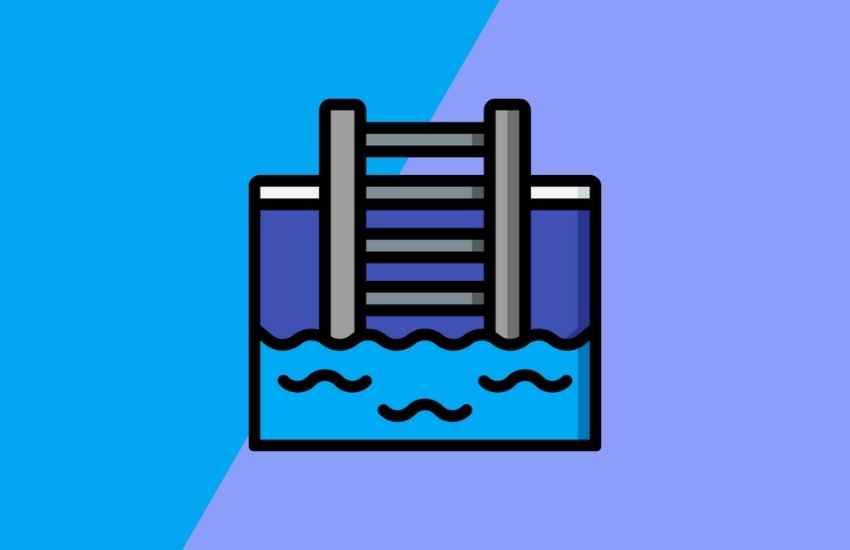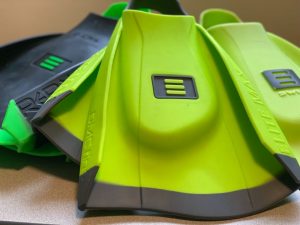
7 Best Swim Snorkels for Better Technique and Faster Swimming
Ready to throw down on a new swimmer’s snorkel? Here are reviews of the best swim snorkels for lap swimming.

Even though your pool is closed for the winter, there is still work to be done. By doing just a few simple things you can protect your pool and make opening the above-ground pool a breeze.
Are you one of the millions of above-ground pool owners that have closed their swimming pools for the season? If you are, then you may be under the impression that there’s nothing left to do regarding it until the spring.
I have found in my 26-years working in the pool industry that this is a common misconception that many above-ground swimming pool owners have.
Even though you winterized your above-ground pool like a boss, there are still some off-season maintenance steps to be done.
These steps are undertaken to help extend the life of your pool and to make it easier to open up back in the spring.
Here are the off-season maintenance steps that I suggest you and every above-ground pool owner try to keep up with until it’s time to open your pool back up again.
You don’t have to be a pool professional to walk around and do a visual inspection of your above-ground pool every other week. It can even be part of your regular cold season yard maintenance plan.
When doing a visual inspection of your pool over the winter, there are no specifics as to what you are looking for. I would describe this task as looking for signs of unusual activity.
What constitutes unusual activity? This may surprise you. It encompasses anything from potential damage being caused by animals to signs that something is amiss with your pool.
See also: How to Open Your Above-Ground Pool Like a Boss
This could be anything such as groundwater movement undermining pool wall supports or pool support pieces that appear to be bending or stressed. You may also see signs of animals burrowing under the pool that pose a risk of putting a hole in your liner or actual animals caught in the pool cover that can ruin it if not removed.
You are just looking for anything that poses a threat to your pool’s integrity. Also, look for signs of bigger problems are that are about to happen and need to be immediately addressed.
Don’t hesitate to call a swimming pool for a professional opinion if you are not sure of what you ate seeing. Circumstances such as early detection of a structural problem can save you thousands of dollars on future repairs.
If you are not interested in doing or do not feel that you have the time to do much off-season pool maintenance, then this is the one task I urge you to do. That’s because if you don’t, it will add extra time and expense when you go to open your swimming pool.
In most areas of the country, the colder months have the potential to bring heavy rains or snow. If you have a cover over your pool, this moisture is going to start to accumulate. Your above ground swimming pool was not designed to be a load-bearing instrument.
Instead, it’s meant to act as a barrier between the clean water under it and the outside elements on top of it. It will eventually get so full of water it falls into your pool. This will create a big mess in your pool water that you will have to deal with in the spring.
See also: How Hard is it to Maintain an Above-Ground Pool?
So, what can you do if it fills with water?
I urge every above ground pool owner to purchase a pool cover pump. These inexpensive pumps can be bought online or at just about any swimming pool supply store.
Use them as water starts to accumulate on your cover to keep it drained. One word of caution, never completely drain your above ground swimming pool cover. That’s because if you leave a few inches of water on top of it, this will keep the wind from getting under the cover and possibly tearing it as it moves around.
Be sure to also check to see if your cover is still firmly in place around the sides of your pool. Another benefit of keeping your cover from getting too full of water is that you can make cover adjustments when necessary. Do this in any spots that appear to be slipping into the pool.
I would advise you if you have an above ground swimming pool that has been closed for the season to also check the water condition in your pool once a month during the non-swimming season. This can be done even if you have placed a cover tightly over the pool for the cooler months.
Just peel back a very small section of cover and peek under it to see if your water is still clear. If it’s getting too green, you can still add some chemicals to help it keep stay clear. This will help you avoid having a time-consuming mess to clean up when opening your pool in the spring.
This does not mean that you can throw chlorine tablets or chlorine shock in your pool. If they do not quickly dissolve, they will sit on your pool liner and ruin it.
Instead, ask your local dealer for some calcium hypochlorite (also known as Cal-hypo). This is a form of pool shock that will quickly dissolve when stirred up in a bucket of water. Once you see no more undissolved chlorine crystals floating in the bucket, it’s then safe to add directly to the pool.
Pool maintenance algaecide can also be added at this time without fear of harming the pool liner.
While you are checking the pool water for clarity, check its level too. If it is unusually low, you may want to call a pool professional to see if anything is amiss. Keep in mind that when you drain water off of your pool cover, the water level in the pool will drop because it’s no longer being pushed upwards by displacement.
Be sure to walk around your above ground pool to make sure that no vegetation is growing up against the walls. If this happens, it can scratch the paint on your pool walls and also trap moisture up against them.
When moisture is being trapped against your walls and supports, it will accelerate the rotting and corrosion of them. For these same reasons, be sure not to stack wood or any other items up against your pool wall in the off-season.
It’s also not unusual for your above ground pool wall to show signs of rust or corrosion over the years since most of its walls are made of metal such as galvanized steel or aluminum.
You may be able to prep and paint your swimming pool walls during the off-season. This will help it look better and help extend its useful life.
Ask a paint professional for their recommendation on how best to do this. This is something that will probably never need to be done to a quality above ground swimming pool.
Here are some of the questions about maintaining above ground pools in the offseason that I get asked the most often:
What do I do if my winter cover falls completely into the water in my above-ground pool over the off-season?
You have a few choices here.
The first is to do nothing. That’s right, even though your pool water may get extremely dirty after your cover falls into it, this should not harm your pool in any way.
You can also try ‘gently’ (because it may have sticks and other potentially damaging debris on it, pulling your winter pool cover out of the water, and putting it back in place.
Use a pool pole with a leaf net to get any large debris out of the pool before attempting this.
Putting a brand-new cover on your pool with the old one still in the water is also an option.
Should I put my above ground swimming pool pump and filter into storage over the winter?
The answer here is both yes and no.
I would definitely take your pool pump inside. The harsh cold season elements can take a toll on them. The same is not true for your pool’s filter. It is made of somewhat flexible plastic.
So, if you leave the bottom drain plug off of it, not enough water will get into it to cause freeze damage.
For sand filters, I would remove the multiport valve on top and store it inside. Be sure to cover the filter tank with a garbage bag if you do this to keep water out of it.
Why does my above ground pool cover fill up so quickly after draining it? This even happens when there is no heavy rain for days?
Unfortunately, it sounds like you have a hole in your winter cover. There is not much you can do here and stop draining your pool cover at all.
If the weather is still warm, you can consider putting a new cover on there too. Don’t worry if your cover fails completely, it won’t usually hurt your pool.
It will just make it harder to get the pool water cleaned up in the spring.
This pool off-season I was thinking about partially burying my above-ground pool during a landscaping project. Will this hurt the swimming pool?
I am happy that you asked this question but you will probably not like my answer. That’s because I am going to tell you to not even consider doing this.
There are several reasons for this.
One, if you lose the water in your pool the pool’s walls will collapse inward from the weight of the soil on them.
Basically, you have just lost your swimming pool. Dirt being placed above the bottom of your above ground pool will also accelerate the rotting and corrosion of the exterior wall and support structure.
You will also never be able to replace your vinyl pool liner. Something which most above ground pool owners need to do about every 5-years.
After reading this, it should now be apparent that closing a pool does not signal the end of your swimming pool maintenance season.
Unfortunately, to keep your above-ground swimming pool in top condition this is a year-round task.
The good news is that doing these simple tasks will significantly increase the lifespan of your pool and go a long way toward making the opening of your swimming pool so much easier. They won’t take you long to do and they don’t have to be done very often.
So, make a schedule of them so your above-ground swimming pool stays in great condition.
6 Awesome Variable Speed Pool Pumps. Frustrated with big electricity bills from your backyard pool? Replace your standard pool pump with one of our favorite cost-saving variable speed pool pumps.
5 Best Heaters for Above Ground Swimming Pools. Want to get more time and use from your backyard pool? Here are our hand-picked selections of the best heaters for above-ground swimming pools.
6 Best Pool Ladders for Above Ground Swimming Pools. Looking for the right pool ladder for your above-ground pool? Here’s a breakdown of the best ones on the market, including key features, price, and more.
Subscribe to the YourSwimLog.com newsletter and get tips and advice on how to swim faster every weekday morning, straight to your inbox.
Join 33,000+ swimmers, coaches, and swim parents learning what it takes to swim like a boss.
Unsubscribe anytime. Email will never be shared or sold.

Olivier Poirier-Leroy Olivier Poirier-Leroy is the founder of YourSwimLog.com. He is an author, former national level swimmer, two-time Olympic Trials qualifier, and swim coach.

Ready to throw down on a new swimmer’s snorkel? Here are reviews of the best swim snorkels for lap swimming.

Looking to get some new swim gear on a budget? Shop the best Black Friday deals for swimmers in this exclusive guide.

Looking for the best swimming app to maximize your time and effort in the water? Here’s a look at the top swim apps for conquering your swim workouts.

Wondering how often you should be testing the water in your pool or spa? Here’s a detailed look at how frequently you should test your pool. Your swimming pool and spa relies on being properly balanced to keep the water clean and safe for swimming. As a pool owner, you

Fed up with the effects and smell of chlorine in your hair after swimming? Here is how to remove chlorine from your hair once and for all.

The DMC Elite fins are high-performance training fins for competitive swimmers. Here’s a review of why these fins are flat-out awesome.

LANE 6 PUBLISHING © 2012-2024 · PRIVACY POLICY · RETURN POLICY · TERMS OF SERVICE · AFFILIATE DISCLOSURE